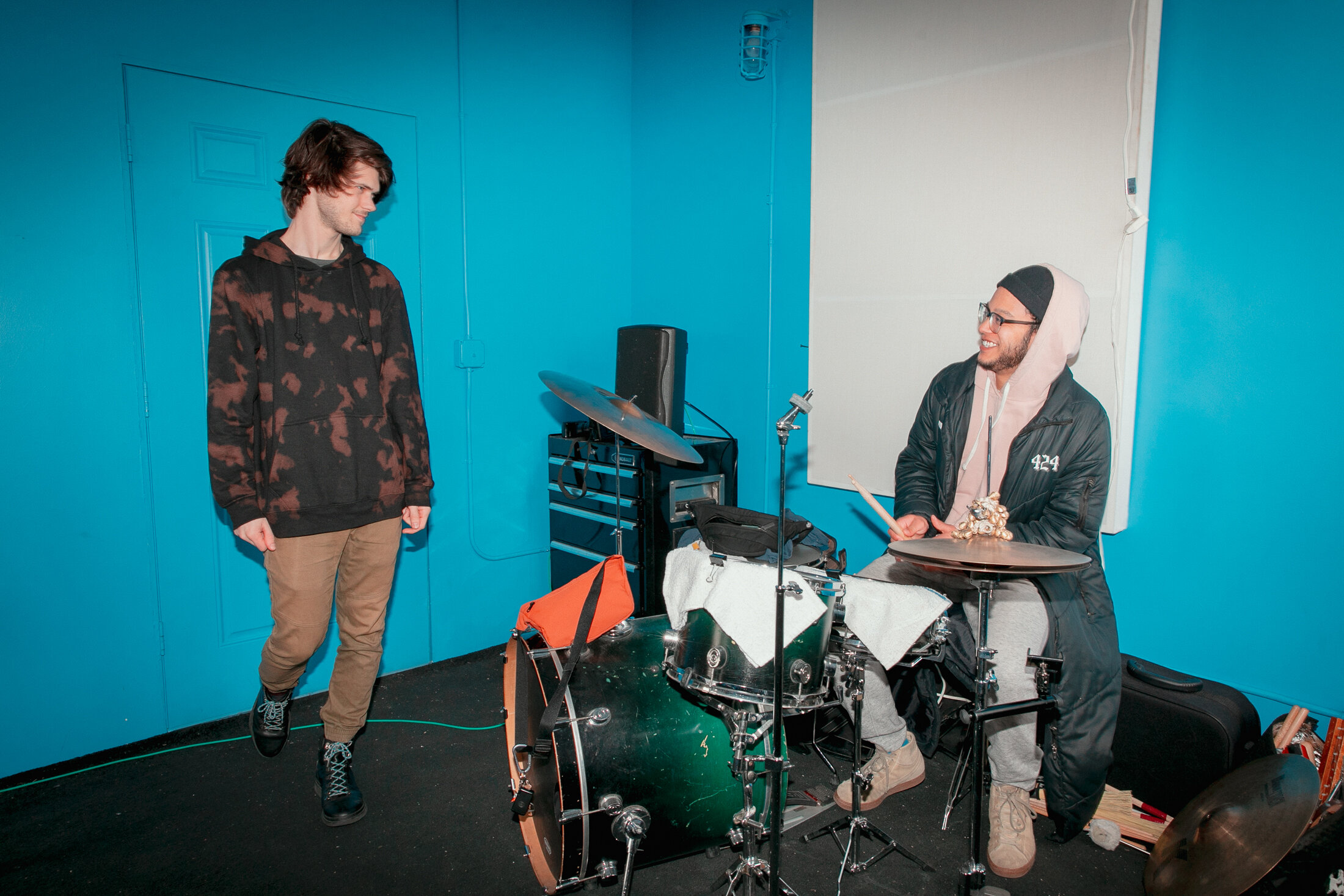By Phillipe Roberts
Mind-bending polyrhythms. Crushing bass. Assertive vocals, yelping, howling, and roaring for attention above brutal noise. In the eternally escalating 2010s post-punk arms race, Crack Cloud “emerged” in 2017 to near-universal praise for both their total command of the genre’s instrumental tropes, and their uniquely gutting chronicles of escape from a host of addictions: drugs, possessiveness, and the parasitic fever dream of capitalism as a whole. So when, in the midst of a pandemic, their “debut” album was announced with the jaw-dropping title Pain Olympics, their fate as wretched rockers at the top of a brooding heap seemed an inevitability. I was excited. You were excited. We all braced for the onslaught.
What a sweet relief to be dead wrong. Rather than the pain-numbing exercise in frantic riffing that might have been suggested by the excellent singles that preceded the album, Pain Olympics instead finds Crack Cloud exposing its soft underbelly, reframing a call to arms as a declaration of rebirth. Throwing off the chains of expectations, the Vancouver collective runs absolutely wild, taking the Olympic theme quite literally as they deliver operatic anthems, juicy, synthesized funk, and devastating acoustic ballads on one of the year’s most vital records. Burn down your fears and fly into the post-truth future–Crack Cloud wait with open arms.
Nowhere is the gravity of their ambition felt more completely than on Pain Olympics’s opener, the dazzling “Post-Truth (Birth of a Nation)”. Hardly a minute into the song’s rumbling introduction–a blistering, tom-heavy charge into call-and-response screeches of guitar, held together by truly sinister sub-bass–the apocalyptic proceedings take a heavenly turn. Guitars fade into oblivion, replaced by an angelic chorus carrying a theremin-like melody reminiscent of a classic space opera score. When the dust settles after five delirious minutes of sonic experimentation that rattles through skronking horns, sampled laughter, and a smattering of industrial noise, it feels as if the curtain has been pulled back on an entire world, ripe for exploration.
Crack Cloud thrives in this nonlinear, open-world mixtape format. Across the album, similar textural trials leave the rhythmic obsessions of their previous works in the dust of time. Previously unthinkable flourishes like the robotic auto-tune crooning on “The Next Fix,” the dizzying mid-song drum solo on “Ouster Stew,” and the smeared guitar shoegazing of “Angel Dust (Eternal Peace),” coexist perfectly with urgent punk drive. Artful transitions between songs blur the lines of genre even further, softening up the mind for whatever curveball lies in wait. Where a lesser “band” might fizzle in attempting such a grandiose shift in tone, Crack Cloud uses their distinct advantage with a collective’s worth of ideas to harness, as well as their time-honed skill, to tame that sprawl with an exacting ear for melody and an eagerness to design a future unhinged from nostalgia.
This endeavor’s success is due in large part to frontman and drummer Zach Choy allowing a greater diversity of voices to take center stage on Pain Olympics. The aforementioned choruses in “Post-Truth” and “Angel Dust” are the most striking examples, but “The Next Fix” and “Favour Your Fortune” both reap benefits from the use of massed voices: the former finding healing in its soothing mantra-like coda, and the latter spiking tension with explosive rhymes that bounce and stretch within the stereo image, surrounding the listener like a ring of fire. When Choy does take control, he wields the mic with deadly conviction. Playing foil to the dingy strums of acoustic guitar on “Something’s Gotta Give,” his ragged inhalations and the way his voice just barely carries the tune of the song ensure that his anguished plea to “please be so kind” hits like a hammer. And in quintessential art-punk form on “Ouster Stew,” he sneers and barks with the best of them, sounding quite perfectly like the doomed, trenchcoat-wearing rebel leader that the song’s music video makes him out to be.
Do not mourn for the Crack Cloud of yesterday. Beneath all the brave, sweeping orchestrations (and sometimes above it, as in the blazing “Tunnel Vision”) they’re still the same triumphantly resilient punk powerhouse that they’ve always been. Through their commitment to unravel their own predispositions and gnaw constantly at the urge to remain landlocked in despair, they’ve vaulted past any notion of capitalist competition to become only more human, more empathetic, and more graceful than ever before. A humble document of the wisdom of collective resistance, Pain Olympics is an essential listen for weary souls eager to get back into the fight.













